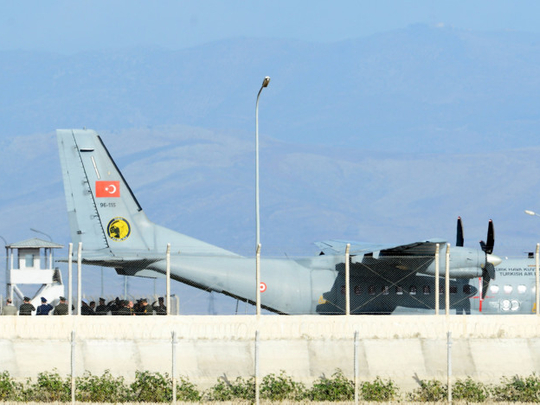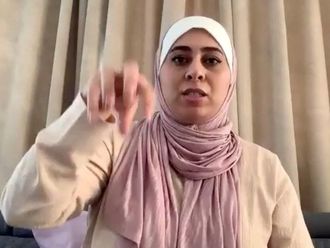
Ankara: The body of a Russian pilot killed when his plane was shot down by Turkey last week will be handed over to a Russian representative after being retrieved from Syria, Turkish Prime Minister Ahmet Davutoglu said Sunday.
“The pilot who lost his life during the air violation was received by us on the (Syrian) border last night,” Davutoglu told reporters in Istanbul before leaving for a meeting with EU leaders in Brussels.
Davutoglu added that a Russian official would travel “soon” to the southern Hatay region with a Turkish military official to take possession of the body.
The Russian embassy in Turkey told the RIA Novosti news agency that Oleg Peskov’s body would be flown on Sunday from Hatay in the presence of Russia’s military attache to an aerodrome in Ankara where it would be met by the ambassador.
The date and time when the body would be returned to Russia was still to be confirmed, embassy spokesman Igor Mityakov was quoted as saying.
One of the two pilots aboard the plane which was downed on Tuesday was shot dead in Syria after parachuting from the burning aircraft, while the second was found safe and sound.
“In accordance with their (Russian) religious tradition, funeral arrangements were carried out by Orthodox priests in Hatay,” Davutoglu said.
Turkey’s military said the Su-24 bomber was shot down by two of its F-16s after it violated Turkish airspace 10 times within a five-minute period on Tuesday.
Russia however said no warning had been given and that the aircraft did not violate Turkish airspace, and demanded an apology.
The incident has led to a sharp deterioration of relations, with Moscow, a major trade partner and Turkey’s largest energy supplier, on Saturday announcing a package of economic sanctions against Turkey.
“Turkey’s relations with Russia is based on mutual benefit and common interests. Therefore I urge the Russian authorities to take this into consideration and act in a cool-headed way,” he said when asked about the sanctions.
On Saturday, Russian President Vladimir Putin signed a decree imposing a raft of punitive economic sanctions against Turkey.
The decree, which entered into force immediately, said charter flights from Russia to Turkey would be banned, that tour firms would be told not to sell any holidays there, and that unspecified Turkish imports would be outlawed, and Turkish firms and nationals have their economic activities halted or curbed.
“The circumstances are unprecedented. The gauntlet thrown down to Russia is unprecedented. So naturally the reaction is in line with this threat,” Dmitry Peskov, Putin’s spokesman, said hours before the decree was published.
A senior Turkish official told Reuters the sanctions would only worsen the standoff between Moscow and Ankara.
But aides to Putin say he is incandescent that Turkish President Tayyip Erdogan has yet to apologise for the Nov. 24 incident near the Syrian-Turkish border in which one Russian pilot was killed along with a Russian marine who tried to rescue the crew of the downed SU-24 jet.
Senior Russian officials have called the episode, one of the most serious publicly acknowledged clashes between a NATO member country and Russia for half a century, a pre-planned provocation.
Erdogan has been equally robust. He has said Turkey will not apologise for downing the jet, saying Ankara was fully within its rights to defend its air space. On Saturday, he appeared to soften his rhetoric a little, saying the episode had saddened him.
Putin’s spokesman suggested the Russian leader was ready for a long standoff however, saying he was “fully mobilised” to tackle what he regarded as an unprecedented threat from Turkey.
The decree, posted on the Kremlin’s website, spoke of the need to protect Russia’s national security and Russian citizens “from criminal and other illegal activities”.
In it, Putin ordered the government to prepare a list of goods, firms and jobs that would be affected. Some of the measures announced have already been informally introduced.
The government is expected to publish the list of banned imports on Monday, Interfax news agency reported, citing a government source. The list is likely to include food and some other products, a second government source said.
Turkey mainly sells food, agricultural products and textiles to Moscow and is also one of the most popular holiday destinations for Russians. Peskov, Putin’s spokesman, said he thought up to 200,000 Turkish citizens could be on Russian soil.
Putin signed the decree days before a climate change summit in Paris. Erdogan said earlier on Saturday it could be a chance to repair relations with Moscow.
“Confrontation will not bring anyone happiness. As much as Russia is important for Turkey, Turkey is important for Russia,” Erdogan said in a televised speech in the western city of Baliksehir.
Peskov said Putin was aware of a Turkish request for him to meet Erdogan on the sidelines of the Paris conference but gave no indication of whether such a meeting would take place.
He called the behaviour of the Turkish air force “absolute madness” and said Ankara’s subsequent handling of the crisis had reminded him of the “theatre of the absurd.” “Nobody has the right to traitorously shoot down a Russian plane from behind,” Peskov told Russia’s “News on Saturday” TV programme, calling Turkish evidence purporting to show the Russian jet had violated Turkish air space “cartoons”.
Turkey’s foreign ministry advised people on Saturday to postpone all non-urgent travel to Russia.
Peskov, according to the TASS news agency, also spoke on Saturday of how Erdogan’s son had a “certain interest” in the oil industry. Putin has said oil from Syrian territory controlled by Daesh militants is finding its way to Turkey.
Erdogan has spoken of slander and asked anyone making such accusations to back up their words with evidence.












